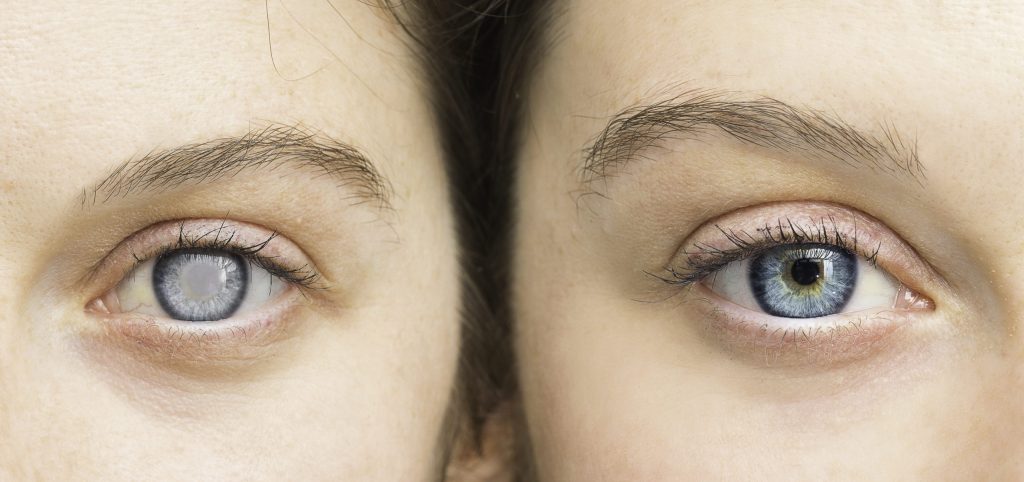How Long Does It Take To Recover From Cataract Surgery? Cataract is an ocular pathology characterized by opacification of the crystalline lens, the lens placed inside the eye that allows you to focus images on the retina.

It can affect one or both eyes and impair vision. In almost all cases, cataracts are linked to the aging process and therefore affect elderly patients. However, there are also juvenile forms, which have a congenital origin and may be due to drugs, trauma, and pathologies. Other possible causes are prolonged exposure to ultraviolet rays, ionizing radiation, and smoking.
With advancing age, the crystalline lens gradually becomes opaque from clear; a clouding due to the aggregation and oxidation of the proteins of the lens. Cataracts can significantly impair vision, disrupting the performance of daily activities and limiting the autonomy of those who suffer from it.
Surgery is the only treatment
“At the moment, the only treatment for cataracts is surgery. Depending on the severity of the cataract and the visual discomfort associated with it, the ophthalmologist will decide when to intervene. The intervention aims to remove the opaque part of the lens and implant a replacement lens, the so-called artificial crystalline or IOL (Intra Ocular Lens)”.
The operation is performed in a day hospital, under local anesthesia by administering eye drops and involves the use of an operating microscope. It is short-lived, safe, and painless. The patient will be asked to keep the eye covered for a day and a few days after the operation, a satisfactory visual recovery is already observed.
How Long Does It Take To Recover From Cataract Surgery
Visual recovery after cataract surgery
Visual recovery after cataract surgery has changed dramatically over the past 20-30 years.
The first cataract operations in the 70-80s were performed with the Intracapsular technique, where the lens was removed in its entirety, together with its capsule, without implanting a replacement artificial lens. To do this, a very large corneal incision (10-12 mm) was made, which was sutured with several stitches, which in turn induced high astigmatism which stabilized after 1-2 months. The duration of cataract surgery with the Intracapsular technique was approximately 1 hour. The patient’s convalescence after the cataract was at least 15-20 days, to prevent the wound from opening and complete recovery of vision after cataract came after 1-2 months when it was possible to make a reliable prescription of glasses.
Later, the extracapsular technique was introduced, where the nucleus of the lens was extracted, but the capsular sac was kept inside which the artificial lens (IOL) was inserted. The duration of the cataract operation with this technique was about 30-45 minutes.

The postoperative course of the cataract with the Extracapsular technique was better and the patient was prevented from staying in bed for the first few weeks, but also in this case a very large closed incision was made with many stitches as a result of the recovery of vision. after cataract surgery, it was a few weeks after post-operative astigmatism stabilized.
The currently used cataract surgical technique, phacoemulsification, has revolutionized post-operative convalescence after cataracts. In this methodology, an instrument consisting of a small ultrasound probe, the phacoemulsifier, is used, which is inserted into the eye through a very small cut of 2-3 mm. The core of the lens is crushed and aspirated directly into the eye and the replacement IOL is inserted into the eye through the small corneal incision, without the need to widen the cut, because we currently have foldable artificial lenses.
The duration of cataract surgery with the phacoemulsification technique is about 15-20 minutes. the postoperative course after cataract surgery with phacoemulsification is better, with little or no post-operative astigmatism and post-operative convalescence of only one day.
Intervention for retinal detachment: recovery and convalescence times
The recovery of sight after retinal detachment surgery is very variable and depends both on the type and severity of the detachment itself and on the type of surgical technique of the retina used.
The oldest surgery is episcleral cerclage/plumbing, where a silicone band is sutured to the outside of the sclera in order to squeeze the bulb and make the retina re-stick and attach. Convalescence after cerclage is shorter, about two weeks, while visual recovery after cerclage is fast, with the patient returning to see discreetly a few days after surgery.
The most modern surgery is vitrectomy, where the vitreous body is aspirated and exchanged with various substitutes, such as balanced saline, silicone oil, and various air/gas mixtures. Convalescence after vitrectomy is longer, about two to four weeks, while visual recovery after vitrectomy is slower, with the patient returning to see discreetly only a few weeks after surgery.
Laser surgery and myopia: recovery and convalescence times
Recovery times after laser surgery for myopia depend on the surgical technique: PRK, FEMTOLASIK, RELEX SMILE.
Visual recovery after PRK is slow, one week to return to one’s activities and one month for a full recovery. Visual recovery after FEMTOLASIK is very fast, vision recovery is less than 24 hours. Vision recovery after RELEX SMILE is fast and LASIK-like.
Like the recovery time after laser surgery for myopia, recovery depends on the surgical technique used. The convalescence after PRK is about a week, while the recovery after LASIK is about one day. Convalescence after RELEX SMILE is also one day.
The big difference in recovery times after myopia surgery depends on the fact that PRK is a surface surgery and an abrasion of the corneal epithelium is done before performing the surgery, while FEMTOLASIK and RELEX SMILE are intrastromal operations. without a superficial corneal abrasion.
Groats disease is a psychiatric disease characterized by the delusional belief that one is dead, in a state of decomposition, or does not exist.
PRK laser surgery: postoperative recovery
Visual recovery after PRK is generally slower than with other excimer laser surgical techniques. The slow visual recovery after PRK laser surgery is due to the fact that the treatment of the cornea with the excimer laser is preceded by the removal (abrasion) of the central corneal epithelium. The corneal epithelium heals by itself in 2-3 days, but in this re-epithelialization process, a central irregularity is created that tends to double vision.
Complete recovery after PRK occurs approximately one month after the operation, once the process of reorganization and regularization of the corneal epithelium has been completed. To help visual recovery after PRK surgery, it is advisable to use artificial tears often, which help minimize the effects of the re-epithelialization process on vision. Visual recovery is then 1 week for returning to work and driving and 1 month for complete vision recovery.
Postoperative recovery after surgery with FEMTOLASIK
The visual recovery after FEMTOLASIK is the fastest among the interventions with the excimer laser for the correction of myopia.
Two lasers are used in this type of surgical technique: the femtosecond laser and the excimer laser. The femtosecond laser is used to create a superficial flap of corneal tissue, which is raised and below this, the actual correction treatment with the excimer laser is performed on the corneal stroma.
Vision recovery after FEMTOLASIK laser surgery is particularly fast because this flap is immediately repositioned and healed instantly, thus closing the wound. Convalescence after FEMTOLASIK surgery is only one day, with the patient able to drive and work from the day after the LASIK laser operation.
Although patients see 10/10 the day after surgery, full recovery of vision after FEMTOLASIK is 1-2 weeks, as a slight veil is formed due to corneal flap formation with the Femto laser.
Useful Tips
After the operation and after the first check-up visit, the doctor will provide the patient with all the information regarding the drug therapy to be taken and the behaviors to be followed in order to ensure a rapid and correct recovery. Generally, we recommend that you:
- Protect your eyes from sunlight and artificial lights (especially if very intense) by wearing sunglasses. In some cases, the specialist may prescribe special post-operative glasses;
- Protect your eye from splashing water while washing;
- Avoid swimming, going to the pool, the sea, etc .;
- Avoid intense sporting activities or any other activity that could stress the eye during the recovery phase;
- Avoid strenuous activities (such as lifting very heavy objects);
- Avoid activities that could cause dust, dirt, and/or other contaminants to enter the eye;
- Avoid rubbing your eyes with your hands, especially if they are dirty.
Further indications and recommendations could be provided by the specialist in the post-operative phase and/or during follow-up visits.
Eyeglasses after Cataract Surgery
Unless an intraocular lens has been inserted into the eye to correct pre-existing vision defects, it may be necessary to wear eyeglasses after cataract surgery.
If the patient will have to use eyeglasses even after the operation, it will be necessary to wait about 30-40 days before being able to prescribe them, naturally after an adequate eye examination.
Reference:
| Name | Website URL |
| Wikipedia | CLICK HERE TO VISIT |








